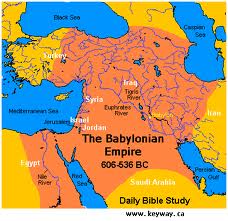
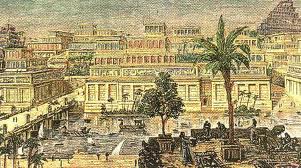
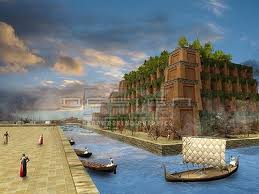
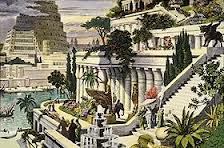
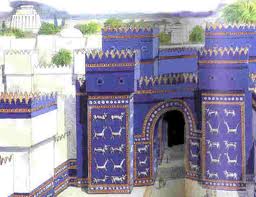
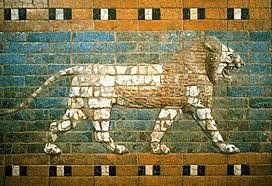
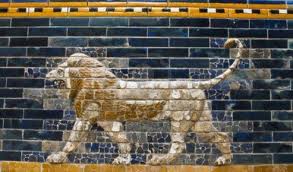
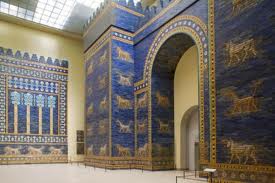
Text source: Wikipedia
BABYLON
Babylon (Arabic: ط¨ط§ط¨ظ„â€ژ, Babil; Akkadian: Bؤپbili(m);[1] Sumerian logogram: Kأپ.DINGIR.RAKI;[1] Hebrew: בض¸ض¼×‘ض¶×œ, Bؤپvel;[1] Ancient Greek: خ’خ±خ²د…خ»دژخ½ Babylل¹“n) was an Akkadian city-state (founded in 1894 BC by an Amorite dynasty) of ancient Mesopotamia, the remains of which are found in present-day Hillah, Babylon Province, Iraq, about 85 kilometres (53 mi) south of Baghdad. All that remains of the original ancient famed city of Babylon today is a large mound, or tell, of broken mud-brick buildings and debris in the fertile Mesopotamian plain between the Tigris and Euphrates rivers. The city itself was built upon the Euphrates, and divided in equal parts along its left and right banks, with steep embankments to contain the river's seasonal floods. Available historical resources suggest that Babylon was at first a small town which had sprung up by the beginning of the 3rd millennium BC. The town flourished and attained independence with the rise of the First Amorite Babylonian Dynasty in 1894 BC. Claiming to be the successor of the ancient city of Eridu, Babylon eclipsed Nippur as the "holy city" of Mesopotamia around the timean Amorite king named Hammurabi first created the short lived Babylonian Empire; this quickly dissolved upon his death and Babylon spent long periods under Assyrian, Kassite and Elamitedomination. Babylon again became the seat of the Neo-Babylonian Empire from 608 to 539 BC which was founded by Chaldeans and whose last king was an Assyrian. The Hanging Gardens of Babylon were one of the Seven Wonders of the Ancient World. After the fall of Babylon it came under the rules of the Achaemenid, Seleucid, Parthian, Roman and Sassanid empires. Name The Greek form Babylon (خ’خ±خ²د…خ»دژخ½) is an adaptation of Akkadian Babili. The Babylonian name as it stood in the 1st millennium BC had been changed from an earlier Babilli in early 2nd millennium BC, meaning "Gate of God" or "Gateway of the God" (bؤپb-ili) by popular etymology.[2] The earlier name Babilla appears to be an adaptation of a non-Semitic source of unknown origin or meaning.[3] In the Hebrew Bible, the name appears as בض¸ض¼×‘ض¶×œ (Babel; Tiberian בض¸ض¼×‘ض¶×œ Bؤپvel; Syriac ـ’ـ’ـ Bؤپwؤ“l), interpreted in the Book of Genesis (11:9) to mean "confusion" (viz. of languages), from the verb בלבלbilbأ©l, "to confuse". History An indication of Babylon's early existence may be a later tablet describing the reign of Sargon of Akkad (ca. 23rd century BC short chronology). The so-called "Weidner Chronicle" states that it was Sargon himself who built Babylon "in front of Akkad" (ABC 19:51). Another later chronicle likewise states that Sargon "dug up the dirt of the pit of Babylon, and made a counterpart of Babylon next to Akkad". (ABC 20:18–19). Van de Mieroop has suggested that those sources may refer to the much later Assyrian king Sargon II of the Neo-Assyrian Empire rather than Sargon of Akkad.[4] Some scholars, including linguist I.J. Gelb, have suggested that the name Babil is an echo of an earlier city name. Herzfeld wrote about Bawer in Iran, which was allegedly founded by Jamshid; the name Babil could be an echo of Bawer. David Rohlholds that the original Babylon is to be identified with Eridu. The Bible in Genesis 10 indicates that Nimrod was the original founder of Babel (Babylon). Joan Oates claims in her book Babylon that the rendering "Gateway of the gods" is no longer accepted by modern scholars. By around the 19th century BC, much of Mesopotamia was occupied by Amorites, nomadic tribes from the northern Levant who were Semitic speakers like the Akkadians of Babylonia and Assyria, but at first did not practice agriculture like them, preferring to herd sheep. Over time, Amorite grain merchants rose to prominence and established their own independent dynasties in several south Mesopotamian city-states, most notably Isin, Larsa and Babylon.
Link to Wikipedia Source
Text source: Wikipedia
ط§طµظ„ ط§ظ„ظ†طµ ظ…ظ† ظ…ظˆظ‚ط¹ ط§ظ„ظˆظƒظٹط¨ظٹط¯ظٹط§
ط¨ط§ط¨ظ„
ط§ظ„ط±ط§ط¨ط· ظپظٹ ظ…ظˆظ‚ط¹ ط§ظ„ظˆظٹظƒظٹط¨ظٹط¯ظٹط§
You are welocome to send your comments and proposals as well any useful photos, documents, links for website update using our following address:
ط§ظ„طµظپطط© طھط±طط¨ ط¨ط§ظٹط© ظ…ظ„ط§طط¸ط§طھ ط§ظˆ ظ…ظ‚طھط±طط§طھ ظƒظ…ط§ طھطھط·ظ„ط¹ ظ„ط§ط³طھظ„ط§ظ… ط§ظٹط© طµظˆط± ط§ظˆ ظˆط«ط§ط¦ظ‚ ط§ظˆ ط±ظˆط§ط¨ط· ظ…ظپظٹط¯ط© ظ„طھطط¯ظٹط«ظ‡ط§ ط¹ط¨ط± ط§ظ„ظ…ط±ط§ط³ظ„ط© ط¹ظ„ظ‰ ط§ظ„ط¹ظ†ظˆط§ظ† ط§ظ„ط§ظ„ظƒطھط±ظˆظ†ظٹ ط§ظ„طھط§ظ„ظٹ
info@uruk-warka.dk
Other updates ... طھطط¯ظٹط«ط§طھ ط§ط®ط±ظ‰
Babylon meeting and report 2004 .... ط§ظ„ظ„ظ‚ط§ط، ط¹ظ† ط¨ط§ط¨ظ„ ظˆطھظ‚ط±ظٹط± ط¹ط§ظ… 2004
Babylon Report 2004 .... طھظ‚ط±ظٹط± ط¹ظ† ظ…ط¯ظٹظ†ط© ط¨ط§ط¨ظ„ 2004
CITY-STATES OF ANCIENT - SUMER ... ط¯ظˆظ„ ط§ظ„ظ…ط¯ظ† ظپظٹ ط³ظˆظ…ط±
Report on Babylon - ط´ط§ظƒط± طط§ظ…ط¯ _طھظ‚ط±ظٹط± ط¹ظ† ظ…ط¯ظٹظ†ط© ط¨ط§ط¨ظ„ ط§ظ„طھط§ط±ظٹط®ظٹط©
Babylon Civilization in Berlin - طط¶ط§ط±ط© ط¨ط§ط¨ظ„ ظپظٹ ط¨ط±ظ„ظٹظ†
Nebuchadnezzar - ظ†ط¨ظˆط®ط° ظ†طµط±
Babylon City 3D ظ…ط¯ظٹظ†ط© ط¨ط§ط¨ظ„
Babylon: A Wonder of the Ancient World - ط¨ط§ط¨ظ„ ظ…ظ† ط¹ط¬ط§ط¦ط¨ ط§ظ„ط¹ط§ظ„ظ… ط§ظ„ظ‚ط¯ظٹظ…
Ancient Babylon - ط¨ط§ط¨ظ„ ط§ظ„ظ‚ط¯ظٹظ…ط©
Babylon Gardens - طط¯ط§ط¦ظ‚ ط¨ط§ط¨ظ„ ط§ظ„ظ…ط¹ظ„ظ‚ط©
Nebuchadnezzar ظ†ط¨ظˆط®ط° ظ†طµط±